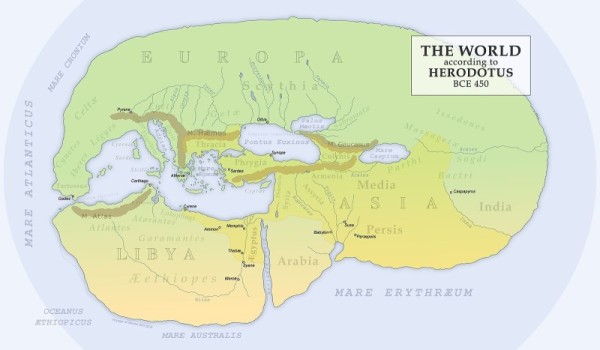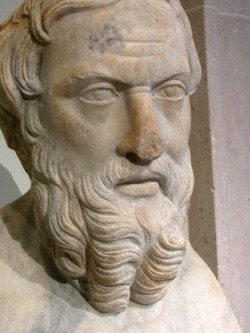The Plan: we shall conquer Babylon: for I shall go straightway as a deserter to the wall; and I shall say to them that I suffered this treatment at thy hands: and I think that when I have convinced them that this is so, I shall obtain the command of a part of their forces.”

Translated by George C. Macaulay — our special project presenting the complete Herodotus with URLs for all of those people, places, events, and things which baffles and discourages modern readers.
Previously on Herodotus
155. And Darius was exceedingly troubled when he saw the man of most repute with him thus maltreated; and leaping up from his seat he cried aloud and asked him who was the person who had maltreated him, and for what deed. He replied: “That man does not exist, excepting thee, who has so great power as to bring me into this condition; and not any stranger, O king, has done this, but I myself to myself, accounting it a very grievous thing that the Assyrians should make a mock of the Persians.” He made answer: “Thou most reckless of men, thou didst set the fairest name to the foulest deed when thou saidest that on account of those who are besieged thou didst bring thyself into a condition which cannot be cured. How, O thou senseless one, will the enemy surrender to us more quickly, because thou hast maltreated thyself? Surely thou didst wander out of thy senses in thus destroying thyself.” And he said, “If I had communicated to thee that which I was about to do, thou wouldst not have permitted me to do it; but as it was, I did it on my own account. Now therefore, unless something is wanting on thy part, we shall conquer Babylon: for I shall go straightway as a deserter to the wall; and I shall say to them that I suffered this treatment at thy hands: and I think that when I have convinced them that this is so, I shall obtain the command of a part of their forces. Do thou then on the tenth day from that on which I shall enter within the wall take of those troops about which thou wilt have no concern if they be destroyed,—of these, I say, get a thousand by the gate of the city which is called the gate of Semiramis; and after this again on the seventh day after the tenth set, I pray thee, two thousand by the gate which is called the gate of the Ninevites; and after this seventh day let twenty days elapse, and then lead other four thousand and place them by the gate called the gate of the Chaldeans: and let neither the former men nor these have any weapons to defend them except daggers, but this weapon let them have. Then after the twentieth day at once bid the rest of the army make an attack on the wall all round, and set the Persians, I pray thee, by those gates which are called the gate of Belos and the gate of Kissia: for, as I think, when I have displayed great deeds of prowess, the Babylonians will entrust to me, besides their other things, also the keys which draw the bolts of the gates. Then after that it shall be the care of myself and the Persians to do that which ought to be done.”

CC BY-SA 2.0 image from Wikipedia.
156. Having thus enjoined he proceeded to go to the gate of the city, turning to look behind him as he went, as if he were in truth a deserter; and those who were set in that part of the wall, seeing him from the towers ran down, and slightly opening one wing of the gate asked who he was, and for what purpose he had come. And he addressed them and said that he was Zopyros, and that he came as a deserter to them. The gate-keepers accordingly when they heard this led him to the public assembly of the Babylonians; and being introduced before it he began to lament his fortunes, saying that he had in fact suffered at his own hands, and that he had suffered this because he had counseled the king to withdraw his army, since in truth there seemed to be no means of taking the town: “And now,” he went on to say, “I am come for very great good to you, O Babylonians, but for very great evil to Darius and his army, and to the Persians, for he shall surely not escape with impunity for having thus maltreated me; and I know all the courses of his counsels.”
157. Thus he spoke, and the Babylonians, when they saw the man of most reputation among the Persians deprived of nose and ears and smeared over with blood from scourging, supposing assuredly that he was speaking the truth and had come to be their helper, were ready to put in his power that for which he asked them, and he asked them that he might command a certain force. Then when he had obtained this from them, he did that which he had agreed with Darius that he would do; for he led out on the tenth day the army of the Babylonians, and having surrounded the thousand men whom he had enjoined Darius first to set there, he slew them. The Babylonians accordingly, perceiving that the deeds which he displayed were in accordance with his words, were very greatly rejoiced and were ready to serve him in all things: and after the lapse of the days which had been agreed upon, he again chose men of the Babylonians and led them out and slew the two thousand men of the troops of Darius. Seeing this deed also, the Babylonians all had the name of Zopyros upon their tongues, and were loud in his praise. He then again, after the lapse of the days which had been agreed upon, led them out to the place appointed, and surrounded the four thousand and slew them. When this also had been done, Zopyros was everything among the Babylonians, and he was appointed both commander of their army and guardian of their walls.
– Herodotus, Book III
| <—Previous | Master List | Next—> |
Herodotus made his living by being interesting. In a world where most people did not read and could not afford to buy a book even if they could, they would pay to listen to Herodotus recite from his books. They would not pay to be bored. In that world, the names that populate his stories would have some general familiarity to his audience. Their obscurity to us is a barrier that this series seeks to break down.
MORE INFORMATION
MAP LIBRARY
Because of lack of detail in maps as embedded images, we are providing links instead, enabling readers to view them full screen.

Leave a Reply
You must be logged in to post a comment.